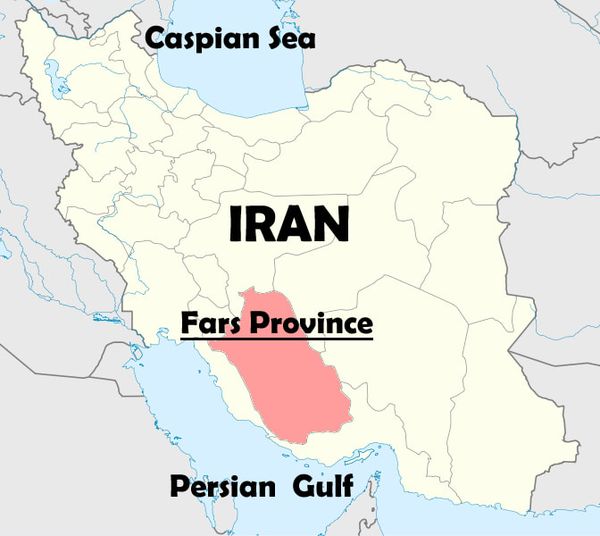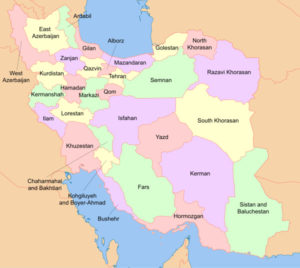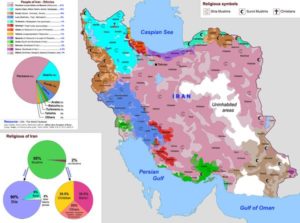Iranian or Persian – the debate continues
Say all your traceable family come from France, and you live in Normandy (a region in France, like Pars (Fars, Persia) is in Iran). If you’re asked what nationality or ethnicity you are – your response would be?
… French right? Not Norman.
Persia/Pars is a province in Iran (modern day Fars province). Ancient Greeks chroniclers, such as Herodotus, mistakenly or deliberately to belittle their rivals, labelled the whole of Iran as Persia (at the time of Cyrus the Great – the Empire of the Medes and Persians).
Persians on the other hand are just one of the Iranian ethnic groups located in the south central part of modern day Iran – shaded pink on the map below. Iran is comprised of many ethnicities of which ‘Persians’ are just over half:
Persians 54%
Azerbaijanis 16%
Kurds 10%
Gilaks and
Mazandaranis 7%
Lurs
(incl. Bakhtiari
people) 6%
Turkmens
(and other tribal
Turks in Iran) 2%
Arabs 2%
Baloch 2%
Other
Iranian ethniticies (including Jewish
and Armenian) 1%
Iranian immigrants (particularly in United States) often refer to call themselves Persians and their ‘mythical’ country Persia, mainly to disassociate themselves from the current regime and anti-Iran Hollywood and media propaganda. There’s also the geographical ignorance problem- when you say Iran in US many automatically think of Iraq which is an Arab country. They wrongfully assume that Iran is an Arab country. Many people in US still don’t know that Iranians are not semitic ( Arab/Hebrew origins) but Indo-European; and, that Persia is part of Iran, and when used to describe the nationality or ethnicity of someone, they are essentially one and the same.
But in Iran since the Acheamenid Empire the people call their land Iran and themselves Iranians.
In 1935 the Iranian government officially asked the rest of the World to call Iran by its native and correct name. Since then everybody calls it Iran, which some have mistakenly taken to mean the land of Aryans.
I say be proud to be Iranian – of your native culture, lands, history, heritage – but also be humble – Iran’s history is great but also flawed. Our history’s greatness and cultural richness comes from the contributions of the many peoples who interacted with Iran – trading partners, vassal states, overlords, etc. Iran has and always will be a melting pot of cultures.
In the words attributed to Cyrus the Great by Xenophon, “Whenever you can, act as a liberator. Freedom, dignity, wealth–these three together constitute the greatest happiness of humanity. If you bequeath all three to your people, their love for you will never die.”(Xenophon, and Larry Hedrick. Xenophon’s Cyrus the Great: The Arts of Leadership and War. New York: Truman Talley /Saint Martin’s, 2006. 119. Print). Love the history, learn from it, and, in the words of Chaplin (‘Dictators’) “Let us fight for a new world – a decent world that will give [everyone] a chance to work – that will give youth a future and old age a security.”
This group is dedicated to the exploration and study of all of those relationships and peoples. Of Iran’s history, viewed as of now and the past. It includes all regions and ethnicities, and, depending on the period being looked at, all geographical regions of which Iran was ruler, or was ruled by. It’s not Iran’s version – it’s our collective heritage.
On the other hand, there are those who from a neutral and non-emotional point of view argue that there is room for both descriptions.
The celebrated historian, Professor Ehsan Yarshater, (Iranian Studies, Vol. XXII, No.1, 1989) argued that “The adoption of the name “Iran” no doubt undermined the country’s cultural reputation and dealt a severe blow to its long-term interests. To educated people everywhere the name “Persia” is associated with a number of pleasing notions that in the main emphasize the country’s cultural heritage. One speaks of Persian art, Persian literature, Persian carpets, Persian miniatures, Persian mosques, and Persian gardens, all of which attest to a general refinement of taste and culture. It is true that “Persian” also brings to the Western mind the Persian wars with Greece, and the home of an absolute monarchy that is often contrasted to Greek democracy; but even then “Persia” does not evoke the image of a weak or backward country, but rather of a robust and mighty empire. Its biblical associations are particularly favorable because of Cyrus’s freeing the Jews from their Babylonian captivity and his assistance in the rebuilding of the Temple in Jerusalem.”
Nevertheless it is clear that although “Persia” today refers to Iran because the country formed over the centre of the ancient Persian empire and the majority of its original citizens inhabited that land, modern Iran is, nevertheless, comprised of a large number of different ethnic and tribal groups. And whilst people who can correctly identify as Persian account for the majority, there are also large numbers of Azeri, Gilaki and Kurdish people, too. While all are citizens of Iran are Iranians, only some can identify their lineage in Persia. In the United Kingdom, no Scot would be heard alive saying they are English, although they might identify with their country, Scotland (which is a real country and not just a province unlike Pars), they are nevertheless British citizens and live in the United Kingdom. Surely, then Iran is the correct name of the country of so many people, and Iranian of its multicultural heritage?





